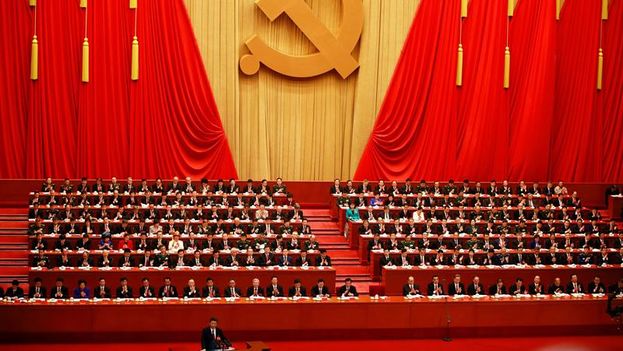
![]() 14ymedio, Reinaldo Escobar, Havana, 18 October 2017 — When the 19th Congress of the Chinese Communist Party, with its hammer and sickle as the dominant element in the decor, opened in the Great Hall of Peking in Beijing, the Cuban government breathed a sigh of relief. Havana is betting that the partisan meeting guarantees the continuity of the system in the Asian giant and puts the power of the United States against the ropes.
14ymedio, Reinaldo Escobar, Havana, 18 October 2017 — When the 19th Congress of the Chinese Communist Party, with its hammer and sickle as the dominant element in the decor, opened in the Great Hall of Peking in Beijing, the Cuban government breathed a sigh of relief. Havana is betting that the partisan meeting guarantees the continuity of the system in the Asian giant and puts the power of the United States against the ropes.
Raul Castro’s government needs the Chinese Party’s conclave to consolidate Beijing’s leading role internationally and for “the Chinese solution” to renew the air of the communist utopia in the face of the “advance of neoliberalism.” The motto of Chinese President Xi Jinping, “a modestly affluent society,” is reflected in the version here of “a prosperous and sustainable socialism.”
With these expectations, national orthodoxy felt at ease with the opening speech of Xi Jinping, who proclaimed to 2,300 delegates that in the next five years they will continue the same policies as in his first five-year term, although more markedly so, and that there will be no space for divergence.
This last point is reassuring to the island’s Government, which has copied many of the Chinese repressive methods, especially those related to internet control, censorship of digital sites, and creating a large army of cyber cops to control or influence the opinions of the internauts.
The island’s government has copied many of China’s repressive methods, such as internet control, digital censorship, and creating a large army of cybercops
However, the most important thing for the Cuban Communist Party is to be able to count on its Chinese counterpart amid a changing international landscape, looking ahead to Raul Castro’s pending departure from the presidency this coming February. Donald Trump’s arrival in the White House, and his backtracking in the diplomatic thaw between both nations, also forces looking in another direction, especially with a Venezuela that every day sinks more deeply into economic problems and political volatility.
The stable ally is China, whose present Congress is a sign of continuity and stability, a power far enough away not to pose a threat to sovereignty and ready to speak up for Havana in international forums. It is a country that ventures to sign economic agreements with the island, though without the magnanimous generosity of the former Soviet Union.
The current relationship between the two regimes is marked by a certain amount of amnesia that makes them forget that years ago the Chinese were not seen in these parts as allies, but as a danger to the cause of communism. Today’s friends were rejected until very recently.
In early 1965, Fidel Castro denounced the distribution of political propaganda by the embassy of the People’s Republic of China among high commanders of the Armed Forces and, a few months later, the Cuban leader ranted against the Asian nation over the decline in its rice sales to the Island.
In 1977, Castro said in an interview with CNN that Mao Zedong “destroyed with his feet what he had created with his head over many years,” an act that “one day the people of China and the Communist Party of China will have to recognize,” he predicted.
After decades of estrangement in the relationship, Havana and Beijing again approached each other in 1989
After decades of estrangement in the relationship, Havana and Beijing again approached each other in 1989 and six years later Fidel Castro made his first state visit to China. References to the disagreements were erased from official books and publications.
Nowadays it is difficult to find in any library one of those manuals prepared by the Communist Party of Cuba in which it called Maoism a “counterrevolutionary current.” The Soviet-produced documentary titled The Long Night Over China has also conveniently gone out of circulation.
This week, when several Chinese-language students approached the Chinese embassy to request published documents about the XIX Congress, they were not even invited in. They were just told that they should make an appointment in advance. In addition to that incident, ordinary Cubans have hardly raised their expectations of what will come out of the Congress in Beijing.
In general, Cubans are convinced that the Chinese wall will not collapse like the Berlin Wall and that the reforms brought about by the current congress will not bring democracy to that country. For its part, the Plaza of the Revolution knows that the island will not have an ally like the Soviet Union, but Raul Castro is relieved to confirm that he is not alone on the planet.
